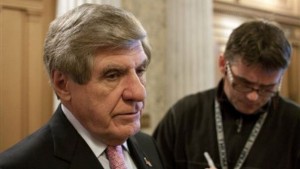 Nebraska Democrat Ben Nelson’s announcement that he is retiring from the Senate can be seen in three different ways. One is that he simply confronted poor poll numbers, coupled with the politics of a state red enough that Barack Obama is guaranteed to lose it.
Nebraska Democrat Ben Nelson’s announcement that he is retiring from the Senate can be seen in three different ways. One is that he simply confronted poor poll numbers, coupled with the politics of a state red enough that Barack Obama is guaranteed to lose it.
Second, Nelson’s demise can be seen as a final verdict on a maneuver that transpired almost exactly two years ago. In case you forgot, Nelson and his Arkansas counterpart, Blanche Lincoln, are the two conservative Democrats who saved the health-care overhaul in late December 2009. Had these two senators stuck to their criticisms of the bill, it would have died in the Senate in late 2009. The bill likely would have been downsized to a modest expansion of Medicaid and some tighter rules for pre-existing illness exclusions.
 Instead, both senators, reluctant to be blamed for the failure of a 63-year-old Democratic-agenda piece and fearing nationally funded primary opposition from the left, swallowed hard and voted yes.
Instead, both senators, reluctant to be blamed for the failure of a 63-year-old Democratic-agenda piece and fearing nationally funded primary opposition from the left, swallowed hard and voted yes.
Neither Lincoln nor Nelson recovered. Lincoln lost in 2010. For Nelson, a significant infusion of off-year independent ad expenditures and relentless attention to Nebraska-based concerns failed to rescue his numbers from the depths they reached after the health-care vote. In Nelson’s case, the failure must be especially galling — given that he traded his vote for a provision that pumped extra federal Medicaid dollars into his state.
The “Nebraska compromise” was never honored, and it was a trade Nebraskans never liked anyway, given their resistance to the rest of the law and, perhaps, their indifference as residents of a low-poverty state to a poverty-based program like Medicaid.
In a less polarized time, the Nelson/Lincoln strategy might have worked. But instead, their states’ heavily conservative voters more or less dismissed the senators as disingenuous poseurs who were trumpeting their independence while obediently serving the interests of their party.
There is one final way to see Nelson’s fall: as one more piece of proof that for the first time in the 150-year history of the two-party alignment, there really is a monolithically conservative party and a just as exclusively liberal party. The ranks of Democratic moderates in both congressional chambers are small now, and their centrism is based more on a demeanor and a skeptical brow than a voting record. Democratic-party-line voting in both chambers is at one of its highest points since FDR’s first term.
That’s a development worth lamenting even if you are a conservative who relishes the likelihood that Nelson’s seat will fall into Republican hands. Obama is still a slight favorite to win reelection, and moderate Democrats have had an unmistakable role in checking his policy ambitions. The fact is that without the resistance of Nelson and Lincoln, as well as Joe Lieberman, the health-care law probably would have contained an even more expensive component, the “public option,” which would have simultaneously ratcheted private premiums even higher.
Not surprisingly, then, some Democrats don’t mind the new shape of things. One more vanished moderate means one less restraint against growing government. The party’s ruling class seems fully prepared to sacrifice whole sections of the country, from the South to the Midwest farm belt, on the theory that inexorable demographic trends will more than make up the losses. It’s all weirdly reminiscent of the projections of strategists in the early Seventies who thought that a surge of new young voters, a rise in minorities, and an explosion of educated suburban professionals meant a sustained Democratic majority. They calculated wrong, and lost three consecutive presidential elections as a result. It’s a risky thing, this business of breaking sharply left in a center-right country.
(Cross-posted, with permission of the author, from National Review Online)









Leave a Reply